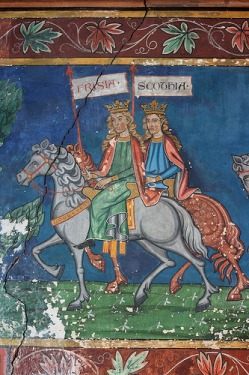The Supposed Dark Ages

Rome has fallen. Next comes what your high school textbook called “The Dark Ages.” When I heard the term “Dark Ages,” I used to think of bands of shrivelled peasants huddled together against the swirling snow on a rocky patch of soil, dropping from exhaustion as bishops whacked them on their heads with scrolls. The fact that Rome was conquered by hordes of growling Barbarians was an awful thing for civilization as a whole. It was not, however, awful for the Frisians. In fact, the Dark Ages marked Frisia’s peak as a world empire.
During the later classical period, the Frisians hit a rough patch. Flooding was so bad in their North Sea homeland that they started mass migrations. A large group went to modern day Flanders. Another group joined the Angles, Jutes, and Saxons in their invasion of Britain. The Frisians had a profound impact on England. Many contemporaries viewed it as a largely Frisian territory. The 6th century Byzantine historian Procopius, when describing the peoples of England, listed only the Saxons and the Frisians. In the 11th century, the Danish epic poem Knútsdrápa used the terms “Frisian” and “English” interchangeably.
(Cinematic side note—remember the 2004 movie King Arthur? Don’t feel bad if you don’t. It was pretty awful. Rushed story telling. Sloppy historical references. Cliched battle scenes. The main reason I saw it was Keira Knightley’s leather war bikini. Anyway, the film’s antagonists were Saxon invaders who were eventually driven back by King Arthur as played by the dashing Clive Owen. If the movie were historical, the Saxons would have been accompanied by a large group of Frisians. Don’t worry about the loss to Arthur, by the way—when he died a couple decades later, the Saxons and Frisians swept through England in an easy conquest.)
Frisian influence was especially strong in the English region of East Anglia. Historians have long wondered at why East Anglian cultural practices differ so sharply from their neighbors. Historian George C. Homans suggests this was because the Frisian influence there was so strong. Modern DNA tests on males from East Anglia and Friesland show there is still a strong genetic link. Even today, Frisian is the language that most closely resembles English.
In leaving their flood-ravaged homeland, the Frisians stumbled onto a lucrative living in conquest and colonization. Besides England, the Frisians also established outposts in Scotland, Norway, Germany, Belgium, France, Denmark. This spurred a thriving trade empire that spanned from Russia to Britain. So renowned were the Frisians as traders and seafarers that in the Dark Ages the North Sea was known as the Mare Frisia.
The Frisians also established themselves in another, less reputable, profession—piracy. By the mid-third century, Frisian pirates were notorious for raiding Roman ships and outposts in Briton. This grand piracy tradition continued throughout the next millennium. In the 16th century, Frisia’s greatest folk hero, Grotte Pier, raised funds for his revolutions through piracy.
During the later classical period, the Frisians hit a rough patch. Flooding was so bad in their North Sea homeland that they started mass migrations. A large group went to modern day Flanders. Another group joined the Angles, Jutes, and Saxons in their invasion of Britain. The Frisians had a profound impact on England. Many contemporaries viewed it as a largely Frisian territory. The 6th century Byzantine historian Procopius, when describing the peoples of England, listed only the Saxons and the Frisians. In the 11th century, the Danish epic poem Knútsdrápa used the terms “Frisian” and “English” interchangeably.
(Cinematic side note—remember the 2004 movie King Arthur? Don’t feel bad if you don’t. It was pretty awful. Rushed story telling. Sloppy historical references. Cliched battle scenes. The main reason I saw it was Keira Knightley’s leather war bikini. Anyway, the film’s antagonists were Saxon invaders who were eventually driven back by King Arthur as played by the dashing Clive Owen. If the movie were historical, the Saxons would have been accompanied by a large group of Frisians. Don’t worry about the loss to Arthur, by the way—when he died a couple decades later, the Saxons and Frisians swept through England in an easy conquest.)
Frisian influence was especially strong in the English region of East Anglia. Historians have long wondered at why East Anglian cultural practices differ so sharply from their neighbors. Historian George C. Homans suggests this was because the Frisian influence there was so strong. Modern DNA tests on males from East Anglia and Friesland show there is still a strong genetic link. Even today, Frisian is the language that most closely resembles English.
In leaving their flood-ravaged homeland, the Frisians stumbled onto a lucrative living in conquest and colonization. Besides England, the Frisians also established outposts in Scotland, Norway, Germany, Belgium, France, Denmark. This spurred a thriving trade empire that spanned from Russia to Britain. So renowned were the Frisians as traders and seafarers that in the Dark Ages the North Sea was known as the Mare Frisia.
The Frisians also established themselves in another, less reputable, profession—piracy. By the mid-third century, Frisian pirates were notorious for raiding Roman ships and outposts in Briton. This grand piracy tradition continued throughout the next millennium. In the 16th century, Frisia’s greatest folk hero, Grotte Pier, raised funds for his revolutions through piracy.
